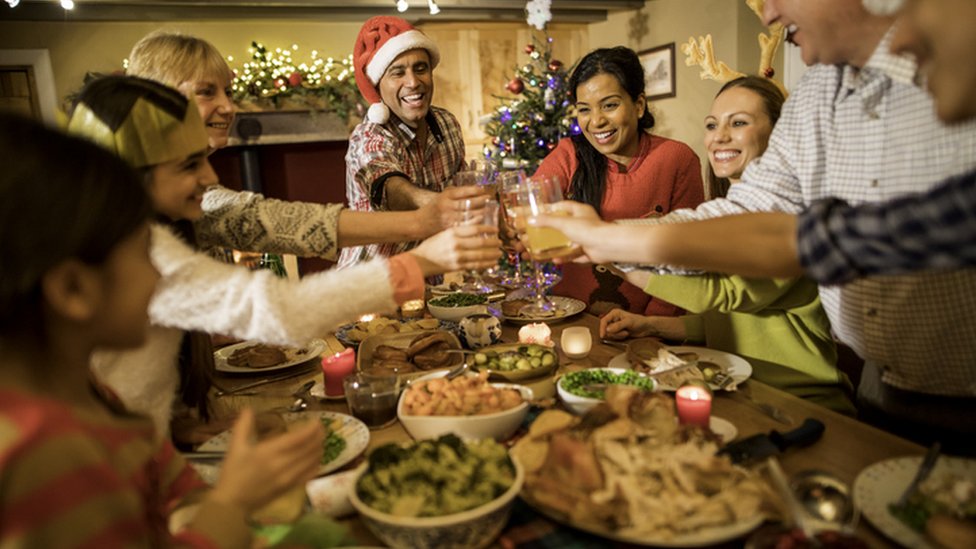Coronavirus: Christmas socialising poses 'substantial risks' - scientist

Prof Andrew Hayward said there would be a "cost" to families getting together.
It comes as ministers are looking at how to relax restrictions so families can celebrate Christmas together.
Scientists have said that for every day measures are eased, five days of tighter restrictions would be needed.
Prof Hayward, a professor of infectious disease epidemiology at University College London, said: "Mixing at Christmas does pose substantial risks, particularly in terms of bringing together generations with high incidence of infection with the older generations who currently have much lower levels of infection and are at most risk of dying if they catch Covid."
Prof Hayward - a member of the government's Scientific Advisory Group for Emergencies - told BBC Radio 4's Today programme: "My personal view is we're putting far too much emphasis on having a near-normal Christmas.
"We know respiratory infections peak in January so throwing fuel on the fire over Christmas can only contribute to this."
All four UK nations - England, Scotland, Wales and Northern Ireland - are trying to work out a common approach to Christmas so families spread across the UK can still meet up.
Any rule change would be for a limited time, maybe just a few days, BBC health correspondent Nick Triggle has said.
Our correspondent said any final decisions would not be made for a few weeks while health chiefs wait to see whether cases have started to come down during the lockdown in England.
But, he said, the advice was likely to urge families not to hold big gatherings and to travel by car, rather than public transport.
England is expected to come out of its second national lockdown on 2 December and return to the tier system of localised restrictions, with household mixing banned indoors in the top two tiers.
Defence Secretary Ben Wallace said he did not want to be "the Grinch that stole Christmas" but he wanted to protect lives during the pandemic.
He told ITV's Good Morning Britain that come 2 December, "decisions will be made" and the government would "try and get that balance right", whilst ultimately ensuring the NHS is safeguarded and lives are protected.
He said: "I don't want to be the Grinch that stole Christmas. I would love all of us to be able to have a Christmas, but more than anything I want us to get through this Covid and try and get this country back to normal and I want to protect lives."
Asked if people should worry more about the health of their parents and grandparents, rather than being able to get together over Christmas, Prof Hayward added: "We're on the cusp of being able to protect those elderly people, who we love, through vaccination and it would be tragic to throw that opportunity away and waste the gains we've made during lockdown by trying to return to normality over the holidays."
His comments follow news that the University of Oxford coronavirus vaccine has shown a strong immune response in adults in their 60s and 70s - raising hopes it could protect age groups most at risk from the virus.
Prof Hayward also said that government messaging had not been consistent.
He said: "When policy is undulating between stay at home to save lives, eat out to help out, the tier system, the second lockdown and now proposals for an amnesty on social distancing - it is a highly inconsistent message.
"The things people need to do to stay safe and keep their loved ones safe are relatively simple - avoid, as far as possible, close contact with people outside your household, avoid crowded places and protect the most vulnerable by not putting them at unnecessary risk."
His warning comes after Public Health England's Dr Susan Hopkins said on Wednesday that tough restrictions might be needed before and after the holiday to allow mixing to take place.
Dr Hopkins, the government's medical adviser on Covid, said they were working on a plan and wanted Christmas to be "as close to normal as possible".
It comes as scientists who advised the government during the early stages of the pandemic have admitted they "never checked" how Covid-19 could be spread by staff working at more than one care home. The researchers were speaking on a BBC documentary focusing on the period before the first lockdown.
Dr Ian Hall, of the Scientific Pandemic Influenza Group on Modelling (SPI-M), admits models did not reflect how care homes actually work, or identify the serious risk posed by agency staff working in different homes.

- VACCINE: How close are we to finding one?
- TREATMENT: How close are we to helping people?
- SYMPTOMS: What are they and how to guard against them?
- LOOK-UP TOOL: How many cases in your area?


- BRAND NEW PODCAST: How to Vaccinate the World - who will get priority?
- RADIO 1'S POWER DOWN PLAYLIST: Billie Eilish gives us two hours of blissed-out warm sounds to relax to


November 19, 2020 at 10:30PM
https://www.bbc.co.uk/news/uk-54998436
Labels: BBC News

0 Comments:
Post a Comment
Subscribe to Post Comments [Atom]
<< Home